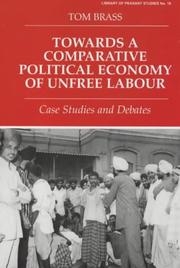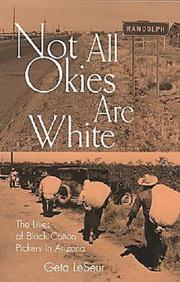| Listing 1 - 10 of 234 | << page >> |
Sort by
|
Book
Year: 1994 Publisher: Pondichéry : Institut Français de Pondichéry,
Abstract | Keywords | Export | Availability | Bookmark
 Loading...
Loading...Choose an application
- Reference Manager
- EndNote
- RefWorks (Direct export to RefWorks)
Les paysans du Tiers monde, et de l'Inde en particulier, sont parfois présentés de manière caricaturale comme des rustres irrationnels, parfois au contraire comme capables de maximiser le profit aussi bien qu'un homme d'affaires occidental. Mais à chaque fois, on sous-estime la diversité des logiques paysannes. C'est ce que cherche à éviter cet ouvrage qui traite des trois échelles géographiques de la vie des agriculteurs de l'Inde du Sud : la région (le « système rural »), le village, l'exploitation agricole. Cependant, à chacun de ces niveaux apparaît une opposition entre les deux régions du Karnataka : l'une irriguée par un important barrage, l'autre vouée à une simple agriculture pluviale ; la première enrichie par la culture intensive de riz et surtout de canne à sucre, l'autre ne survivant que par l'émigration. De nombreux éléments révèlent les contraintes ou les atouts dont doivent tenir compte les paysans : la structure des castes encore si hiérarchisée, les différences de classes, mais aussi les problèmes du crédit, des marchés et du bétail, le rôle de l'administration indienne, tout autant que le « poids » de l'hindouisme, souvent exagéré. Loin de se cantonner au particulier, l'ouvrage propose une grille d'analyse générale des logiques paysannes du Tiers monde. Pris entre les contraintes du milieu naturel et les politiques de développement rural de l'État, l'agriculteur y apparaît pleinement rationnel dans ses stratégies, en fonction de logiques qui n'ont pas toutes pour but le profit financier.
Book
Year: 1983 Publisher: Lisboa : Etnográfica Press,
Abstract | Keywords | Export | Availability | Bookmark
 Loading...
Loading...Choose an application
- Reference Manager
- EndNote
- RefWorks (Direct export to RefWorks)
"O seu único livro publicado, Através dos Campos, ( ... ) não é só um trabalho de etnografia - detalhado e cheio de cor. Com o ser um breviário perfeito da economia agrária do Alto Alentejo, guarda também nas suas páginas alguns dos mais belos e cristalinos pedaços de prosa portuguesa nos últimos trinta anos. Livro único, livro claro, sadio, o livro de José da Silva Picão há-de ser arrolado entre os melhores padrões da nossa literatura contemporânea".
Book
Year: 2022 Publisher: Stanford, California : Stanford University Press,
Abstract | Keywords | Export | Availability | Bookmark
 Loading...
Loading...Choose an application
- Reference Manager
- EndNote
- RefWorks (Direct export to RefWorks)
Agricultural laborers --- Agriculture --- History.
Book
ISBN: 0292734727 Year: 2011 Publisher: Austin : University of Texas Press,
Abstract | Keywords | Export | Availability | Bookmark
 Loading...
Loading...Choose an application
- Reference Manager
- EndNote
- RefWorks (Direct export to RefWorks)
Puerto Rico, Hawai'i, and California share the experiences of conquest and annexation to the United States in the nineteenth century and mass organizational struggles by rural workers in the twentieth. Organized Agriculture and the Labor Movement before the UFW offers a comparative examination of those struggles, which were the era's longest and most protracted campaigns by agricultural workers, supported by organized labor, to establish a collective presence and realize the fruits of democracy. Dionicio Nodín Valdés examines critical links between the earlier conquests and the later organizing campaigns while he corrects a number of popular misconceptions about agriculture, farmworkers, and organized labor. He shows that agricultural workers have engaged in continuous efforts to gain a place in the institutional life of the nation, that unions succeeded before the United Farm Workers and César Chávez, and that the labor movement played a major role in those efforts. He also offers a window into understanding crucial limitations of institutional democracy in the United States, and demonstrates that the widespread lack of participation in the nation's institutions by agricultural workers has not been due to a lack of volition, but rather to employers' continuous efforts to prevent worker empowerment. Organized Agriculture and the Labor Movement before the UFW demonstrates how employers benefitted not only from power and wealth, but also from imperialism in both its domestic and international manifestations. It also demonstrates how workers at times successfully overcame growers' advantages, although they were ultimately unable to sustain movements and gain a permanent institutional presence in Puerto Rico and California.

ISBN: 1317827368 1315821931 131782735X 9781317827351 9780714649382 Year: 2016 Publisher: London
Abstract | Keywords | Export | Availability | Bookmark
 Loading...
Loading...Choose an application
- Reference Manager
- EndNote
- RefWorks (Direct export to RefWorks)
Book
ISBN: 9780292734722 0292734727 9780292726390 0292726392 0292743963 Year: 2011 Publisher: Austin : University of Texas Press,
Abstract | Keywords | Export | Availability | Bookmark
 Loading...
Loading...Choose an application
- Reference Manager
- EndNote
- RefWorks (Direct export to RefWorks)
Puerto Rico, Hawai'i, and California share the experiences of conquest and annexation to the United States in the nineteenth century and mass organizational struggles by rural workers in the twentieth. Organized Agriculture and the Labor Movement before the UFW offers a comparative examination of those struggles, which were the era's longest and most protracted campaigns by agricultural workers, supported by organized labor, to establish a collective presence and realize the fruits of democracy. Dionicio Nodín Valdés examines critical links between the earlier conquests and the later organizing campaigns while he corrects a number of popular misconceptions about agriculture, farmworkers, and organized labor. He shows that agricultural workers have engaged in continuous efforts to gain a place in the institutional life of the nation, that unions succeeded before the United Farm Workers and César Chávez, and that the labor movement played a major role in those efforts. He also offers a window into understanding crucial limitations of institutional democracy in the United States, and demonstrates that the widespread lack of participation in the nation's institutions by agricultural workers has not been due to a lack of volition, but rather to employers' continuous efforts to prevent worker empowerment. Organized Agriculture and the Labor Movement before the UFW demonstrates how employers benefitted not only from power and wealth, but also from imperialism in both its domestic and international manifestations. It also demonstrates how workers at times successfully overcame growers' advantages, although they were ultimately unable to sustain movements and gain a permanent institutional presence in Puerto Rico and California.

ISBN: 0826212719 082626221X 9780826262219 9780826212719 Year: 2000 Publisher: Columbia, Mo. : University of Missouri Press,
Abstract | Keywords | Export | Availability | Bookmark
 Loading...
Loading...Choose an application
- Reference Manager
- EndNote
- RefWorks (Direct export to RefWorks)
"Vividly revealing the challenges faced by a group of migrant workers who eventually farmed the multiracial town of Randolph, Arizona, Not All Okies Are White is a celebration of the resilience and adaptability of people too often ignored by history texts." "Not All Okies Are White recaptures the ways of life for black migrant workers, as well as Hispanics and Native Americans, in the first half of the century through richly detailed interviews of the families of Randolph's founders. Through the words of each narrator, these personal stories recount work experiences and survival strategies offering new insights into the people's relationship to the land. The narratives reveal a creative tension between place and identity, movement and migration. LeSeur provides a historical, cultural, and literary context for the oral histories by incorporating news articles, information culled from historical society archives, analyses of films and novels, advertisements, and photographs." "Not All Okies Are White will appeal to scholars and general readers interested in oral history, African American history, multicultural studies, and women's studies."--Jacket.
Cotton farmers --- African American agricultural laborers --- Afro-American agricultural laborers --- Agricultural laborers, African American --- Negro agricultural laborers --- Cotton growers --- Farmers, Cotton --- Growers, Cotton --- Agricultural laborers --- Farmers --- E-books
Book
ISBN: 1857520319 9781857520316 9781906108199 1857521366 1906108196 Year: 2012 Publisher: Aberdeen: Research Institute of Irish and Scottish Studies, University of Aberdeen,
Abstract | Keywords | Export | Availability | Bookmark
 Loading...
Loading...Choose an application
- Reference Manager
- EndNote
- RefWorks (Direct export to RefWorks)
John Dickie was born in Aberdeen in 1824. Five years later the family moved to a croft at Balquhain, in the shadow of Bennachie, and up to the age of 23 his world was contained within a 15-mile radius of Inverurie. An itinerant farm servant, John worked at Harlaw, Thainstone, Daviot, Tarves, Udny and Oldmeldrum until in December 1847 he exchanged the country for the city, when he returned to Aberdeen to marry and take up employment as a warehouseman. Throughout his life John Dickie enjoyed dipping his pen in the ink. Some of his efforts were for the benefit of others: on two occasions in the 1860s he petitioned his employers, on behalf of his fellow workers, to request a Saturday half-day and an increase in wages. But his most illuminating piece of work is this unpublished memoir of his early years, which reflects not only his personal rhythms of life and work, but also the impact of regional and national issues on the farming communities of Aberdeenshire.
Agricultural laborers --- Social conditions --- Dickie, John,
Book
ISBN: 9819955815 9819955807 Year: 2023 Publisher: Singapore : Springer,
Abstract | Keywords | Export | Availability | Bookmark
 Loading...
Loading...Choose an application
- Reference Manager
- EndNote
- RefWorks (Direct export to RefWorks)
This book examines the migration of Indians (mainly from the Punjab region in north India) to parts of northern Italy, especially the Emilia-Romagna region. It analyzes the mobility patterns of migrants who occupy a niche in the labour market and unpacks the forward and backward linkages that migrants imagine, experience, and endure, not only in the context of the materiality of livelihood opportunities and income generation in Italy but also through affect, as potential immigrants and then as migrants, in a territorial and imagined space. The book unravels uncertainties and anxieties about identity among youth, women, and men through in-depth interviews. It also examines a reassertion of cultural tropes that portray identity in marked and vexed ways. The book brings a mutual recognition and acceptance of diversity, or its lack, in a European nation. It stands out for its nuanced ethnographic detail, its attention to the voices of youth and women, and exploration of their relationship with the host community. The book, therefore, is a must-read for everybody interested in a better understanding of migration and the culture of migration in different countries.
Agricultural laborers, Foreign --- East Indians --- Social aspects
Book
ISBN: 9390259282 9789390259281 9788170350378 Year: 2021 Publisher: New Delhi Daya Publishing House, a Division of Astral InternationalPvt.Ltd
Abstract | Keywords | Export | Availability | Bookmark
 Loading...
Loading...Choose an application
- Reference Manager
- EndNote
- RefWorks (Direct export to RefWorks)
Study with reference to agricultural labor households in Bandar Taluk, Krishna District, Andhra Pradesh, based on 1981-1982 data.
| Listing 1 - 10 of 234 | << page >> |
Sort by
|

 Search
Search Feedback
Feedback About UniCat
About UniCat  Help
Help News
News